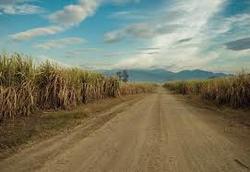Tate & Lyle accused of betraying Cambodia families whose land was allegedly taken
by Rebecca Ratcliffe
Tate & Lyle has been accused of betraying 200 families in Cambodia who have fought for years to secure compensation for land they say was taken from them to make way for a sugar plantation.
Residents in Koh Kong, Cambodia, say their livelihoods, and their children’s futures, were devastated when their land was taken from them in a process that began in 2006. The land was later used to supply sugar to Tate & Lyle.
Seven years ago, the Guardian interviewed affected communities who described how, without space to farm, they had little choice but to work on the plantation, which was run by Thai KSL Group.
People who worked for KSL in Cambodia said they earned as little as 79p a day cutting 1,000 stems of sugar cane, and that children as young as nine were among those working. KSL subsequently denied allegations that it had used child labour, and said that its employees earned a decent wage.
In 2013, 200 families from Sre Ambel district launched a lawsuit against Tate & Lyle in the high court in London, claiming that Tate & Lyle knew – or should have known – of the allegations against its supplier. They demanded compensation for the value of sugar grown on land they allege still belongs to them.
Drawn-out negotiations followed, and families say that they were led to believe that they could expect significant compensation from Tate & Lyle. Yet, earlier this year, they say, the sugar company said it would not pay anything.
“Initially we thought that Tate & Lyle respected human rights, and we hoped they would take responsibility,” said Ann Haiya, a community leader from Koh Kong.
“The community is very, very angry and feels hopeless, but they will keep their will to work with the community leaders to keep fighting against Tate & Lyle,” he added.
In a statement, Martyn Day, senior partner at the firm Leigh Day, which represents the families, said it was disappointing that Tate & Lyle had chosen to walk away from the settlement discussions. “The claimants entered into settlement discussions with Tate & Lyle in good faith over six years ago, but these discussions have led to nothing but empty promises and disappointment,” he said.
Tate & Lyle, Day said, had been exclusive beneficiaries of the sugar produced on the land for a number of years and were involved in the plantation “from an early stage”.
When asked whether it intended to pay compensation to affected families, Tate & Lyle Sugars said it would continue to use any leverage it had “to ensure the villagers receive financial compensation from KSL and its ex-business partner”.
The company said it put pressure on its supplier over seven years “through many trips to Cambodia and meetings with various interested parties, including the Cambodian government”.
Tate & Lyle used the KSL Group for its supplies from Cambodia from 2011, and stopped buying sugar from the country in 2013.
The 200 families have received 1.5 hectares of land each from KSL Group through a government-led scheme, while affected communities elsewhere, who did not pursue legal action, have received financial compensation.
It is understood that KSL feel they have discharged their responsibility towards the families by allocating 300 hectares of land.
Tate & Lyle says it believes it helped bring about the assignment of land to families – a claim Leigh Day disputes.
Community leaders say the compensation received so far is completely inadequate, and that the 1.5 hectares of land is, for many, just a fraction of what they lost. Many were forced to sell their compensation plots immediately because they desperately needed to pay off debts they had accumulated as a result of the ordeal.
“Before, we used our land to cultivate rice, and farm cashew, mango and jackfruit – part of it we sell, part of it we use,” said Ann. He lost 13.5 hectares of land in 2006, he said.
In order to buy food and pay for basics such as healthcare, he, like others, had little choice but to borrow money. “The loan becomes like double loan,” he said, adding that debts quickly rose.
Day said that it was “wholly inadequate” for Tate & Lyle to suggest that responsibility for financial compensation lay solely with its supplier. “The losses suffered by the claimants were well documented and widely reported and Tate & Lyle were well aware of their losses when they received sugar from KSL’s plantation,” he said.
The economic damage wrought on families is hard to quantify, said Eang Vuthy, executive director of Equitable Cambodia, an NGO that has supported affected families. Some young people have had to migrate to neighbouring countries, leaving their families behind, so that they can send back money. “When people migrate they are again exposed to great vulnerability in the new place,” he said.
Community leaders in Koh Kong said that in many cases children had been unable to finish school because of the financial pressures facing their families, and now have even greater challenges in finding work.
Eang said Tate & Lyle should commit to speedily finalising a settlement. “Until they do so, its consumers should be aware that by supporting Tate & Lyle’s business, they are making it easier for the company to avoid its responsibility.”
In a statement Tate & Lyle Sugars said: “We recognise our responsibilities under the OECD guidelines for multinational companies to use our leverage to ensure our Cambodian ex-supplier KSL compensates the villagers for the damage they have suffered.”
It added that it was frustrated that not all affected families have received financial compensation. “We are actively working with other stakeholders to see what pressure we can bring to bear,” the company said.












